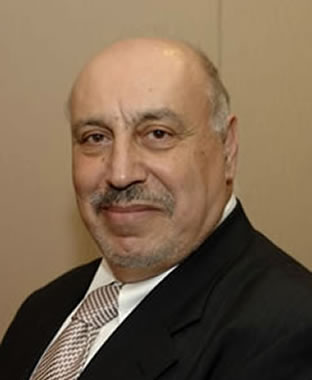UTSA physics researcher Miguel Yacaman receives honorary doctorate from Mexican university

Miguel Yacaman

Miguel Yacaman
(Nov. 17, 2010)--To honor lifetime achievements in the advancement of physics and particularly nanotechnology research, the Autonomous University of Nuevo Leon (UANL) in Monterrey, Mexico, has awarded UTSA Professor Miguel Jose Yacaman an honorary doctorate degree. The honorary degree is a first for Yacaman, who is chair of the UTSA Department of Physics and Astronomy in the College of Sciences and has served on the president of Mexico's Scientific Advisory Council of Sciences.
Yacaman is recognized internationally for his expertise in nanotechnology, electron microscopy and the physics of materials. His career spans 40 years and includes expertise in electron microscopy; the synthesis and characterization of new materials; their surfaces, interfaces and defects; quasicrystals; archaeological materials; and catalysis, the introduction of a chemical to increase the rate of a chemical reaction.
Born in Mexico City in 1946, Yacaman received his bachelor's and master's degrees in physics from the National University of Mexico in the late '60s and his doctorate degree in materials science there in 1972.
From 1976 to 1977, he was a post-doctoral researcher in the Department of Metallurgy and Materials Science at the University of Oxford, England. The following year, he was a research associate in the Materials Science Branch of the NASA-AMES Research Center at Moffett Federal Airfield in Sunnyvale, Calif.
Yacaman's productive career includes a series of academic, industry and government appointments. In the early '70s, he served on the faculty at the National University of Mexico, where he earned tenure and became director of the university's Institute of Physics, one of the top research institutes in Mexico.
Later, he served as executive secretary of the National System of Research in Mexico and as deputy director for scientific research at the Consejo Nacional de Ciencia y Tecnologia (CONACYT). The latter is Mexico's equivalent of the U.S. National Science Foundation. Yacaman's career includes time as the general director of the National Institute of Nuclear Research of Mexico. From 1997 to 2006, he served on the University of Veracruz Board of Regents. In 2000, he was recruited to the faculty at the University of Texas at Austin. Two years ago, he joined UTSA's faculty.
Yacaman currently is engaged in the new and rapidly growing field of nanotechnology. He teaches undergraduates and graduates and researches the development of nanoparticles, nanorods, nanowires and nanocrystals for a variety of applications including nanoelectronics, health and catalysis. In 2009, his reputation and knowledge in electron microscopy led industry leader JEOL to install the world's most advanced electron microscope on the UTSA Main Campus. The JEM ARM-200F microscope magnifies samples up to 50 million times and up to 150 million times with the help of advanced software. The microscope and was made possible with a gift from the Robert J. Kleberg Jr. and Helen C. Kleberg Foundation.
UANL presented Yacaman with his honorary degree at a ceremony commemorating the bi-centennial of Mexican Independence Day. The ceremony included UANL leaders, Mexican elected and appointed officials, and colleagues from throughout Yacaman's career.
"The Autonomous University of Nuevo Leon has strengths in physics, engineering and nanotechnology and is located in one of Mexico's most economically important states, Monterrey," said Yacaman. "It is a pleasure and an honor to receive this honorary doctorate degree. I am very humbled at the recognition."
Events
The UTSA Office of Undergraduate is proud to celebrate National Undergraduate Research with an annual event sponsored by the (OUR) featuring students will showcase undergraduate student research and creative endeavors from all disciplines across campus.
Various LocationsDía en la Sombrilla, formerly Fiesta UTSA, is a festival hosted each spring as a part of Fiesta® San Antonio events. Sponsored by Roadrunner Productions, the event features music, food, confetti, games, event t-shirts, and more.
Sombrilla Plaza and Central Plaza, Main CampusFiesta Arts Fair features contemporary art from more than 100 artists from across the U.S., Fiesta favorite foods, drinks, live music by local and regional performers, and a Young Artists Garden providing opportunities for budding artists to learn, explore and express their creativity.
UTSA Southwest CampusJoin the PEACE Center and Wellbeing Services for Denim Day, a day of learning about the importance of consent and why we wear denim on the last Wednesday of the month each April during Sexual Assault Awareness Month. Stop by our Denim Day display to take a photo in front of our Denim Wall, spin the "Is It Consent?" Wheel, and get a Concha or goodie.
Student Union Window Lounge, Main CampusLearn to use Zotero®, a citation manager that can help you store and organize citations you find during your research. Zotero can generate bibliographies in various styles, insert in-text citations and allow you to share sources with collaborators.
Virtual EventThis event is to achnowlege the graduating seniors and induct the new cohart of scholars to our program.
North Paseo Building (NPB 5.140,) Main CampusCelebrate the accomplishments of College of Education and Human Development, College for Health, Community and Policy, College of Sciences and University College.
Alamodome

